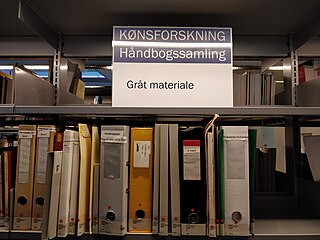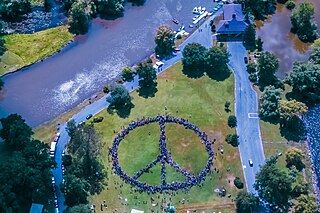
The Semantic Web, sometimes known as Web 3.0, is an extension of the World Wide Web through standards set by the World Wide Web Consortium (W3C). The goal of the Semantic Web is to make Internet data machine-readable.
A web portal is a specially designed website that brings information from diverse sources, like emails, online forums and search engines, together in a uniform way. Usually, each information source gets its dedicated area on the page for displaying information ; often, the user can configure which ones to display. Variants of portals include mashups and intranet dashboards for executives and managers. The extent to which content is displayed in a "uniform way" may depend on the intended user and the intended purpose, as well as the diversity of the content. Very often design emphasis is on a certain "metaphor" for configuring and customizing the presentation of the content and the chosen implementation framework or code libraries. In addition, the role of the user in an organization may determine which content can be added to the portal or deleted from the portal configuration.
In common usage, evaluation is a systematic determination and assessment of a subject's merit, worth and significance, using criteria governed by a set of standards. It can assist an organization, program, design, project or any other intervention or initiative to assess any aim, realizable concept/proposal, or any alternative, to help in decision-making; or to generate the degree of achievement or value in regard to the aim and objectives and results of any such action that has been completed.

An insurgency is a violent, armed rebellion by small, lightly armed bands who practice guerrilla warfare against a larger authority. The key descriptive feature of insurgency is its asymmetric nature: small irregular forces face a large, well-equipped, regular military force state adversary. Due to this asymmetry, insurgents avoid large-scale direct battles, opting instead to blend in with the civilian population where they gradually expand territorial control and military forces. Insurgency frequently hinges on control of and collaboration with local populations.
Human security is a paradigm for understanding global vulnerabilities whose proponents challenge the traditional notion of national security through military security by arguing that the proper referent for security should be at the human rather than the national level. Human security reveals a people-centred and multi-disciplinary understanding of security which involves a number of research fields, including development studies, international relations, strategic studies, and human rights. The United Nations Development Programme's 1994 Human Development Report is considered a milestone publication in the field of human security, with its argument that ensuring "freedom from want" and "freedom from fear" for all persons is the best path to tackle the problem of global insecurity.

The Convention on the Elimination of all Forms of Discrimination Against Women (CEDAW) is an international treaty adopted in 1979 by the United Nations General Assembly. Described as an international bill of rights for women, it was instituted on 3 September 1981 and has been ratified by 189 states. Over fifty countries that have ratified the convention have done so subject to certain declarations, reservations, and objections, including 38 countries who rejected the enforcement article 29, which addresses means of settlement for disputes concerning the interpretation or application of the convention. Australia's declaration noted the limitations on central government power resulting from its federal constitutional system. The United States and Palau have signed, but not ratified the treaty. The Holy See, Iran, Somalia, Sudan, and Tonga are not signatories to CEDAW.
Environmental security examines threats posed by environmental events and trends to individuals, communities or nations. It may focus on the impact of human conflict and international relations on the environment, or on how environmental problems cross state borders.

Grey literature is materials and research produced by organizations outside of the traditional commercial or academic publishing and distribution channels. Common grey literature publication types include reports, working papers, government documents, white papers and evaluations. Organizations that produce grey literature include government departments and agencies, civil society or non-governmental organizations, academic centres and departments, and private companies and consultants.
Simple Knowledge Organization System (SKOS) is a W3C recommendation designed for representation of thesauri, classification schemes, taxonomies, subject-heading systems, or any other type of structured controlled vocabulary. SKOS is part of the Semantic Web family of standards built upon RDF and RDFS, and its main objective is to enable easy publication and use of such vocabularies as linked data.
Peace journalism is a style and theory of reporting that aims to treat stories about war and conflict with balance, in contrast to war journalism, which peace journalism advocates say display a bias toward violence. The theory proposes practical methods for correcting biases in stories appearing in the mainstream and alternative media, and suggests ways for journalists to work with other media professionals, audiences, and organizations in conflict.

Peacebuilding is an activity that aims to resolve injustice in nonviolent ways and to transform the cultural and structural conditions that generate deadly or destructive conflict. It revolves around developing constructive personal, group, and political relationships across ethnic, religious, class, national, and racial boundaries. The process includes violence prevention; conflict management, resolution, or transformation; and post-conflict reconciliation or trauma healing before, during, and after any given case of violence.
Maritime security is an umbrella term informed to classify issues in the maritime domain that are often related to national security, marine environment, economic development, and human security. This includes the world's oceans but also regional seas, territorial waters, rivers and ports, where seas act as a “stage for geopolitical power projection, interstate warfare or militarized disputes, as a source of specific threats such as piracy, or as a connector between states that enables various phenomena from colonialism to globalization”. The theoretical concept of maritime security has evolved from a narrow perspective of national naval power projection towards a buzzword that incorporates many interconnected sub-fields. The definition of the term maritime security varies and while no internationally agreed definition exists, the term has often been used to describe both existing, and new regional and international challenges to the maritime domain. The buzzword character enables international actors to discuss these new challenges without the need to define every potentially contested aspect of it. Maritime security is of increasing concern to the global shipping industry, where there are a wide range of security threats and challenges. Some of the practical issues clustered under the term of maritime security include crimes such as piracy, armed robbery at sea, trafficking of people and illicit goods, illegal fishing or marine pollution. War, warlike activity, maritime terrorism and interstate rivalry are also maritime security concerns.
Cloud storage is a model of computer data storage in which data, said to be on "the cloud", is stored remotely in logical pools and is accessible to users over a network, typically the Internet. The physical storage spans multiple servers, and the physical environment is typically owned and managed by a cloud computing provider. These cloud storage providers are responsible for keeping the data available and accessible, and the physical environment secured, protected, and running. People and organizations buy or lease storage capacity from the providers to store user, organization, or application data.

The Human Security Report Project (HSRP) is a peace and conflict studies research group. The Project is presently based at Simon Fraser University's School for International Studies at Harbour Centre in Vancouver, British Columbia, Canada, having formerly been based at the University of British Columbia's Liu Institute for Global Issues in the Human Security Centre.
The Uppsala Conflict Data Program (UCDP) is a data collection program on organized violence, based at Uppsala University in Sweden. The UCDP is a leading provider of data on organized violence and armed conflict, and it is the oldest ongoing data collection project for civil war, with a history of almost 40 years. UCDP data are systematically collected and have global coverage, comparability across cases and countries, and long time series. Data are updated annually and are publicly available, free of charge. Furthermore, preliminary data on events of organized violence in Africa is released on a monthly basis.
The WomanStats Project is a donor-funded research and database project housed at Brigham Young University that "seeks to collect detailed statistical data on the status of women around the world, and to connect that data with data on the security of states." The WomanStats Database has the most comprehensive compilation of information on the status of women in the world. Coders comb the extant literature and conduct expert interviews to find qualitative and quantitative information on over 300 indicators of women's status in 174 countries with populations of at least 200,000. Access to the online database is free.

Political violence is violence which is perpetrated in order to achieve political goals. It can include violence which is used by a state against other states (war), violence which is used by a state against civilians and non-state actors, and violence which is used by violent non-state actors against states and civilians. It can also describe politically motivated violence which is used by violent non-state actors against a state or it can describe violence which is used against other non-state actors and/or civilians. Non-action on the part of a government can also be characterized as a form of political violence, such as refusing to alleviate famine or otherwise denying resources to politically identifiable groups within their territory.
The Armed Conflict Location & Event Data Project (ACLED) is a non-governmental organization specializing in disaggregated conflict data collection, analysis, and crisis mapping. ACLED codes the dates, actors, locations, fatalities, and types of all reported political violence and demonstration events around the world in real time. As of 2022, ACLED has recorded more than 1.3 million individual events globally. In addition to data collection, the ACLED team conducts analysis to describe, explore, and test conflict scenarios, with analysis made freely available to the public for non-commercial use.
VOCEDplus is a free international research database about tertiary education, maintained and developed by staff at the National Centre for Vocational Education Research (NCVER) in Adelaide, South Australia. The focus of the database content is the relation of post-compulsory education and training to workforce needs, skills development, and social inclusion.
Women in Law & Development in Africa (WiLDAF) is a Pan-African women's rights organization and network which is non-profit and non-government (NGO) and contains 500 organizations, 1200 individuals and spreads over 27 countries. Even though WiLDAF functions as a multi-regional/transnational organization, it pays close attention to the economical, social and historical differences between states and countries.







